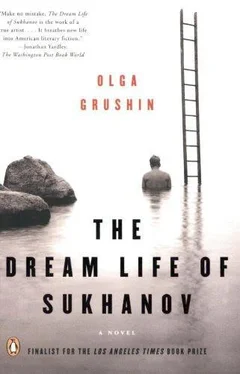“So you threw my paintings away,” said Anatoly Pavlovich in a flat voice, and lowering himself onto the chair, covered his face with his hands—and cried.
And for a while the world was so silent that it felt as if a deep hush, a hush of finality, of lost chances, of all the things that had gone wrong and could never be changed, enveloped it, never to lift again. Yet after some time—whether a fragment of an hour or another lonely stretch of a century—uncertainly, out of the soundless void, timid noises began to emerge: the whispering of trees, the barking of far-off dogs, the chirping of a canary on a windowsill, the trembling voice of an old woman talking, sighing, imploring someone named Tolenka to please understand, to please forgive, she had never thought he would need them again and she had been so afraid to live with all those monstrosities, but even so, she would never have done it had she not believed that it was the best thing for him, getting rid of it all, yes, she had always feared his pictures would lead to no good, and was it not her duty as a mother to keep him safe, to help him make the best of his life, to steer him away from his father’s fate—
He lifted his head, remembering his mother’s presence for the first time. Her eyes were moist; her hand hovered over his, ready to descend at any instant.
“My father’s fate?” he repeated blankly. “Was that why? You destroyed all my work because you were afraid I’d end up like my father ?”
And as he spoke, he already felt the disbelief, the emptiness, the grief inside him turning into anger—anger of a heart-searing, soul-wrenching kind he had never known before, anger at this pathetic little woman with a frightened face who had once given him life.
“You don’t know what I went through with your father, Tolenka,” she whispered.
“What does it matter what you went through? Times have changed. You don’t honestly think they throw people in jail for paintings these days?”
She pulled her hand away. “You mustn’t talk to me like that,” she said. “You’ve never heard the whole story, you can‘t—”
He felt as if he did not know who she was.
“What story?” he said, standing up, furiously pushing his chair away. “You and my father had the misfortune of living through a very dark period. He was arrested, they broke him, he committed suicide. Tragic things like that happened all the time in the thirties—not in the sixties or the seventies! And it certainly didn’t give you the right to throw away—”
“It wasn’t about that, Tolya!” she cried. “Your father wasn’t arrested, I just—”
She stopped abruptly, searched the table with frantic eyes, lifted a cup of cold tea to her lips. The cup rattled loudly when she put it down, breaking the silence.
He stared at her.
“I don’t believe it,” he said slowly. “I always thought you produced that tale for the sake of a ten-year-old boy, but you’ve actually managed to convince yourself, haven’t you? Hospitalized for years, is that right? With the flu! My God, and to think I never realized how the thirties warped your mind! Just what kind of a world do you live in, Mother, what kind of a sick, delusional—”
She sat averting her eyes, her hands clasped tightly together.
“Not the flu,” she said, and her voice was different now, low and brittle. Taken aback by the change of her tone, he swallowed the harsh words on his tongue and leaned to look closer into her face. The early twilight had laid deep shadows along her cheeks and in the corners of her mouth, stamping her features with the unfamiliar, stark, sorrowful look of some fifteenth-century saint. Suddenly uneasy, he reached for the lamp switch.
“Please, no light,” she said in the same unrecognizable voice. “It’s… easier this way. Sit down, Tolya. I didn’t mean to tell you, I always felt it was my burden alone, it just slipped out…. But I guess it’s time you knew.”
“Knew what?” he asked, his throat dry. He remained standing.
“Your father never was in prison. It’s true. He was… ill, very ill. It happened in Gorky, they had to put him in a hospital.” She swallowed audibly. “A mental hospital. His doctor telephoned me, told me the name of his condition and everything—”
“But Mama,” he exclaimed in desperation, “don’t you see, they did these things all the time—took people away and lied to their families! The man who called you, I’m sure he wasn’t a doctor, he must have been a—”
“Tolya,” she said evenly, “don’t you think I considered that? But it was true. I knew it was true. I myself had noticed that he was becoming… well, different. Already in Moscow, he was beginning to say strange things, but I thought he was just being fanciful, joking with me, nothing more. Then, after he moved to Gorky, he became preoccupied with this crazy idea he had, only he didn’t think it was crazy—it was his ‘great discovery,’ it was going to change the world…. He grew so earnest about it, working on it every night, hardly sleeping. It frightened me. He became secretive, too—always worrying that his colleagues would find out and take away his ‘project,’ as he called it.” She was mincing the cake on her plate into chocolate dust with quick, nervous stabs of a spoon, not looking up. “The doctor told me it was common for… for people with his illness to become obsessed with some idea in this way, and that they would work with him, it was a good hospital, he only needed to receive some shock great enough to snap him out of it, and many other things, I forgot a lot of it, I was too upset….”
A draft of silence passed between them.
“So how long was he—” he said thickly.
“Almost three years. October 1939 to May 1942. That was when they released him to work at a military factory. They thought that the war had helped him—that when he heard the country needed him he abandoned all his fantasies at last. I thought so too, until he sent me that last letter. He wrote that he had finally finished his great project but asked me to say nothing about it yet, it was all going to be such a wonderful surprise…. I cried all day, and it was hard, I had to hide it from you because you were so happy—we were to see him in just a few weeks. I remember I so much wanted to believe everything would be well….”
The shadows lengthened along the kitchen floor, and the tangerine-colored moon, still round but already on the wane, sleepily sailed from behind a roof into the pale sky.
“His project,” he said quietly. “What was it, do you know?”
“When they took him away, they found dozens of notebooks in his office, covered front to back with squiggles, drawings of birds, crazy numbers—they could make no sense of them at all. But I always knew what he was trying to do. It started in Moscow, in the early thirties. There was a museum show once, winged suits for people or something, I don’t recall exactly. Your father took you to it, I think, but of course you were too young to remember. Well, something at that show must have impressed him, because that was when he first began to talk about it—whether it was possible for a man to fly without a plane or a parachute or anything—to fly as birds fly. The finest human accomplishment it would be, the perfect exercise of sheer will, he used to say, greater than anything art or science had ever invented, and other eloquent things—I’m not an educated woman, I didn’t understand much, I just laughed, except that he was serious all along….” She looked up, and her eyes were intent, desperate, searching for some sign in her son’s face. “After… after he died, Tolenka, my greatest fear was that… that you also… because the doctor warned me it could happen again, these kinds of illnesses can be passed on… But everything was going so well for a while—and then you started to paint these dark, strange pictures of yours—and I don’t know, it was as if something happened to me, as if every time I looked at them, I was staring at your father’s death, and I grew so afraid, I wanted to make you stop, to make you forget, to make it all disappear, and that was why… They were heavy too, I had to carry them down the stairs, and I was so scared the neighbors might see me…. But please, Tolenka, you were right to give it up, you have a perfect life now, you make us all proud, all these books you write—”
Читать дальше








![Theresa Cheung - The Dream Dictionary from A to Z [Revised edition] - The Ultimate A–Z to Interpret the Secrets of Your Dreams](/books/692092/theresa-cheung-the-dream-dictionary-from-a-to-z-r-thumb.webp)



